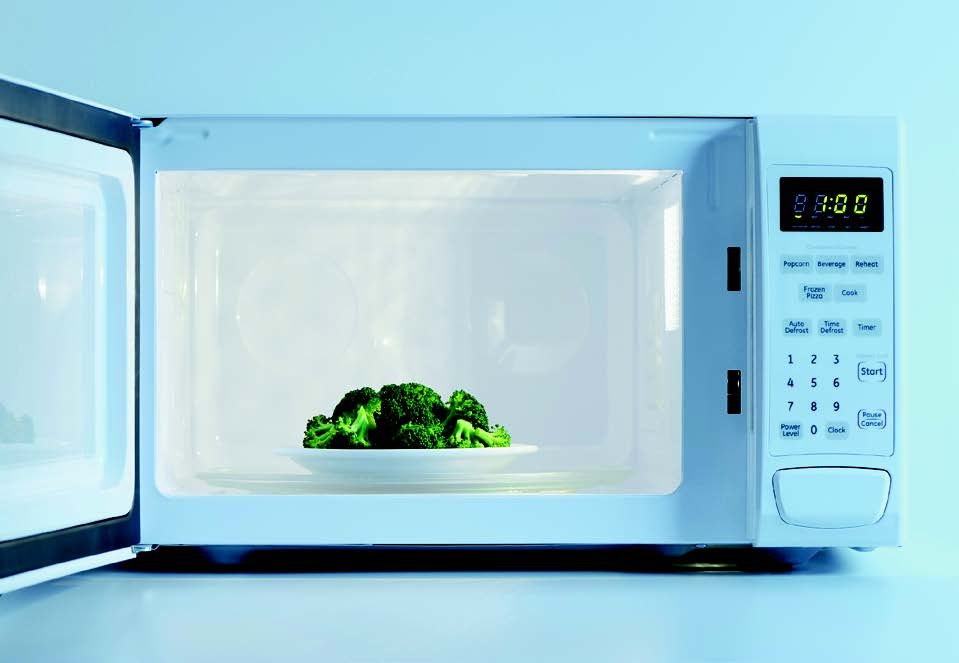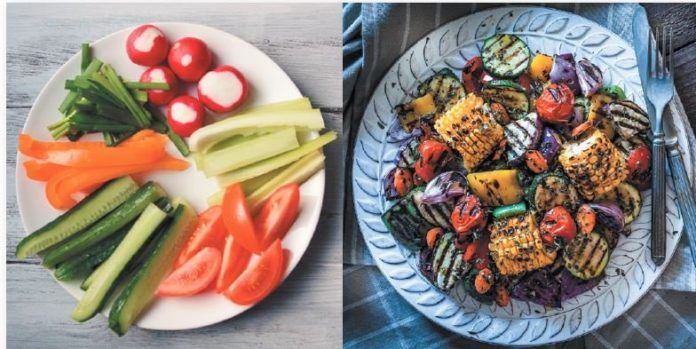Vegetables are an excellent source of vitamins, minerals, phytochemicals, and fiber, and health-conscious consumers naturally want to know how to get the most nutritional impact from these powerful foods. “Nutritionally, there are pluses and minuses to cooking vegetables,” says Helen Rasmussen, PhD, RD, a senior research dietitian at Tufts’ Jean Mayer USDA Human Nutrition Research Center on Aging. For example, cooking carrots reduces levels of vitamin C (which plays an important role in maintaining collagen, the glue that holds cells together) but increases availability of beta-carotene, a precursor of vitamin A (which plays an important role in vision, reproduction, bone growth, and regulating the immune system).
Reduced Concentration. Some nutrients will be lost in any cooking method. “Some vitamins are not very stable,” says Rasmussen. “The longer a food is exposed to heat, the more vitamin C levels are reduced, for example.” The concentration of some nutrients is particularly affected by cooking in water. “Vitamin C and B vitamins are water soluble, as are certain phytochemicals, like flavonoids,” says Jeffrey B. Blumberg, PhD, a research professor at Tufts’ Friedman School of Nutrition Science and Policy. “They leach out into water when the vegetables are boiled.” Blumberg recommends eating produce high in these nutrients (like broccoli, kale, and bell peppers) raw. “When you do cook them, try methods like steaming, blanching, sauting, roasting, or microwaving, which use little water,” says Blumberg. If you do boil your vegetables in excess water, Rasmussen recommends using that water to make broths or sauces, rather than pouring nutrients down the drain.

Image © EasyBuy4u | Getty Images
Increased Availability. Eating a raw diet to avoid losing nutrients to cooking is not the answer. A study published back in 2008 in the British Journal of Nutrition found that following a strict long-term raw food diet was associated with relatively high blood levels of beta-carotene and normal levels of vitamin A, but low levels of prostate-cancer fighting lycopene. “Heat breaks down the cell matrix and allows some nutrients to be released from the cell walls,” says Rasmussen. This explains why studies find cooked tomato products like tomato sauce and ketchup have higher levels of available lycopene than raw tomatoes. Other studies have found vegetables like carrots, spinach, broccoli, mushrooms, zucchini, asparagus, cabbage, and peppers supply more carotenoids to the body when cooked than when eaten raw.
Method Matters. How vegetables are cooked and eaten does make a difference in nutrient availability and absorption. In general, steaming preserves nutrients best, since this method avoids the leaching of water-soluble compounds and limits exposure to heat that can degrade some vitamins. Regardless of cooking method, some nutrients will be better absorbed if veggies are prepared or eaten with some healthy fat. “Fat soluble vitamins (A, D, E, and K) and phytonutrients (especially beta-carotene, lycopene, and other carotenoids) are better absorbed when cooked with vegetable oil,” says Blumberg. “Chopping also helps release these health-promoting compounds.” When eating vegetables raw, such as in a salad, add some dressing, avocado, or nuts to help with absorption of fat-soluble nutrients.
“The best choice is to eat vegetables however they most appeal to you,” says Rasmussen. Blumberg agrees. “Taste and texture matter. If you don’t like them, you won’t eat them at all,” says Blumberg. “More important than raw versus cooked is to eat your veggies. Getting 50 percent of a nutrient is still better than getting nothing.”
-Eat a variety of vegetables and enjoy them raw or cooked to vary the nutrients your body receives.
-Cook with less water and heat exposure when possible to preserve water-soluble and heat-sensitive nutrients. (Try steaming, microwaving, or blanching.)
-Pair veggies high in fat-soluble nutrients (such as asparagus, carrots, Swiss chard, and squash) with healthy fats (like vegetable oil, seeds, nuts, and avocado) to increase absorption.
-Store non-root veggies in the refrigerator to preserve nutrients longer (although keeping some out where they can be seen may increase intake).
-Wash raw vegetables well to remove any bacteria. Rinse with clean cold water; use a vegetable brush for produce with thick skin; soak produce with nooks and crannies (such as broccoli and cauliflower) for one to two minutes in clean cold water.






















My mother, (1901 to 1997) learned when she was quite young that vegetables were to be cooked in a minimum of water. Bring them to a boil, and immediately turn the heat down to low for about five minutes. The trick being to stop the cooking as soon as the minimum amount of water was used was boiled off. Rarely did she have any water left to put in to soups. She was aware of the loss of nutrients by boiling in too much water. When she was living people did not saute veggies. I have copied her methods for cooking veggies. I eat most raw. Recently I have been reading that kale is not a good veggie to eat as it picks up certain bad elements as it grows which are deleterious to one’s being. Have any of your researchers come across that notion? I like kale, but due to what I have read in publications received from various physicians over this country, I am suspicious as to whether I should trust my instinct to eat kale.
I wonder if organic kale would be best. I haven’t heard this.
Ms V Some super markets sell organic baby kale so you don’t have the pesticides and is young enough to have picked up the elements you are speaking of. I have read similar things about carrots. I hope this helps.
How about steaming kale instead of eating it raw?
Is pressure cooking a good or bad method for cooking vegetables?
For asparagus and broccoli, I generally microwave them for 3 minutes with a drizzle of EVOO, pinch of salt and pepper. For stir fry or sautéed I mix them with other veggies with some EV coconut oil. Carrots I usually blanch or eat raw, potatoes and sweet potatoes I microwave for about 5-7 minutes depending on size and number of pieces. I wash produce well with cold water and soak them some 2-3 minutes in water with baking soda.
I appreciate that there are many different vitamins and flavonoids, a host of vegetables and different lengths, temperatures and styles of cooking, still it would be helpful to have some idea of how much nutrition of the various nutrients is gained or lost in whether you eat vegetables raw or cooked. Are we talking 10%, or 80%. Surely there must be some information on this. If not, exhaustive testing vegetable by vegetable would give nutrition scientists plenty of publication opportunities,:)
I usually saute kale (or spinach) in olive oil. It takes only a short time until they are wilted. I eat them at that point. I doubt they lose much nutritionally in that brief exposure to heat.
I’ve heard washing fruits like blueberries and grapes and veggies like lettuce in vinegar and water for a few minutes is a good way to get bacteria and dirt off them.??